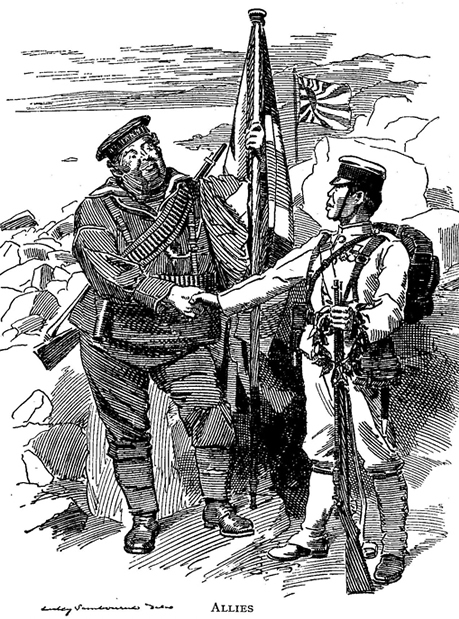 |
| Anglo-Japanese Treaty |
The Anglo-Japanese treaty was signed between Lord Lansdowne (1845–1927), the British foreign secretary, and Hayashi Tadasu (1850–1913), the minister of Japan, on January 30, 1902, in London to create an alliance scheduled to last five years. Its terms gave Japan an equal partnership with a great power of the Western world.
The purpose of this first military agreement was stabilization and peace in northeast Asia. On Japan's side it was to prevent Russian expansionism in northeast Asia, and on Great Britain's side it protected British interests and its commerce in China.
Japan felt vulnerable due to Russian influence in Manchuria and interest in Korea. The Anglo-Japanese treaty allowed Japan to become a more powerful player in world diplomacy and in negotiations with Russia.

The revision of the Anglo-Japanese treaty was signed on August 12, 1905, between Lansdowne and Hayashi in Lansdowne's residence. The new terms included an extension of the area covered by the alliance to include India, British recognition of Japan's right to control Korea, and Japan's recognition of Great Britain's right to safeguard her possessions in India.
It also provided that in the event of any unprovoked attack neither party would come to the assistance of its ally. The alliance would remain in force for the following 10 years. The new terms showed Japan had increased its status in international society after winning the war over Russia.
The third Anglo-Japanese alliance agreement was negotiated in 1911 after Japan's annexation of Korea. Important changes concerned the deletion of the articles related to Korea and India and the extension of the alliance for 10 more years. The second revision accommodated Japan's annexation of Korea but also, at Britain's request, excluded the United States from the region. The alliance enabled Japan to participate in World War I as a British ally.
With World War I beginning in the summer of 1914 and with political changes in China, Anglo-Japanese relations entered a new era. The new situation in the Far East restulted in a closer relationship between the United States and China.
With the outbreak of the Russian Revolution and Civil War in 1917, U.S. participation in the war, and later the publication of President Woodrow Wilson's Fourteen Points on how to end the war, the groundwork was set for new national relations.
These new circumstances brought changes in Anglo-Japanese relations after World War I. Great Britain no longer feared the Russian expansion in China and had developed a close relationship with the United States. The United States had also started to view Japan as a competitor in East Asia. The problems of China were also affecting international politics.
As a result, the United States decided to call a conference whose aim was to prevent expansion in China. At the Washington Conference (1921–22) Anglo-American cooperation in Asia allowed the United States to force Japan to accede to an end of the Anglo-Japanese alliance. The official termination of the alliance took place on August 17, 1923.